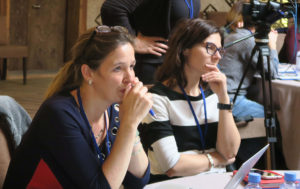
Author: Aïcha Chaghouani, The Netherlands
Different trends of more restrictive legislation hinder the development of a healthy, independent and diverse civil society in Eastern Europe and Central Asia (EECA). Shrinking civil society space in the EECA countries is making the work of many non-governmental organisations more difficult.
NGOs play a crucial role in the development of effective HIV/AIDS responses. Non-governmental organisations meaningfully involve community key population groups for a better understanding of their needs. The experts are saying that the limited space that NGOs are allowed to maneuver in, is threatening the effectiveness of national and regional policies to contain and stop the growth of the HIV epidemic in the region.
AFEW’s assessment of the situation
Many NGOs in the EECA region, especially those working with key populations and in the field of harm reduction, are currently facing significant challenges. International donors are withdrawing from the region while most local governments are unwilling and/or failing to take over. The withdrawal of funds together with the shrinking civil society space are threatening the investments made and progresses achieved in the last decades in the field of HIV/AIDS.
AFEW International’s experts Janine Wildschut and Magdalena Dabkowska conducted a mixed-methods research to explore the process of shrinking civil society space in the EECA countries, how this affects NGOs and how they are coping with it. With this research, AFEW has gained more insights and learned how NGOs are currently dealing with those challenges. The research is part of AFEW’s regional approach within Bridging the Gaps: health and rights of key populations project.
Coping strategies and regional exchange
The ultimate aim of the research was to assess the coping strategies in a context of shrinking space of civil society in EECA.
“I believe that these coping strategies are vital in the current circumstances and demonstrate the big resilience of the communities and NGOs working with key populations,” says AFEW’s director of programmes Janine Wildschut.
The research was conducted in Kazakhstan, Kyrgyzstan, Poland, Tajikistan, Russia and Uzbekistan. This mixed-method research consisted of a general primary assessment of the whole region, semi-structured interviews with NGOs and donors, and a survey.
AFEW’s experts believe that by mapping different strategies AFEW is able to facilitate a regional exchange of success and failure stories in which NGOs can learn from each other’s experiences. The identification of different strategies helps organizations to develop more comprehensive coping mechanisms in the current contexts.
“We hope to raise more awareness with donors about the situation of NGOs in the shrinking space of civil society, and will offer coping tools to NGOs,” says Janine Wildschut.
Fight, hide or unite
The outcomes of the research identified three main resilience strategies NGOs adopted in order to overcome the challenges. They are: fight – opposing the authorities, hide – opposing, allying or neutral but out of sight and silent, and unite – allying with the authorities. All interviewed NGOs had different reasons to choose one of these three paths.

“We want to be more diplomatic. If you are being too much of an activist, you can also just break your organization,” an NGO employee from Tajikistan said.
For some organizations, it was possible to create alliances with the local or national authorities and still continue their work while for others, creating these alliances meant stopping or changing part of their core activities.
“We believe that it is actually ethically wrong to be in alliance with this government. We also do not try to be invisible for them. We do not do anything illegal so we do not hide anything,” a Russian NGO employee said. “There is no law we are violating so there is nothing to hide. If they want to change or stop us we just go to court. We have a lot of strategic activities including cases against the government.”
Further discussion
Which out of ‘fight, hide or unite’ positions is the most suitable for an NGO, depends on the characteristics of the organization, the context it is operating in and the beliefs of its employees.
“The different paths identified by the assessment could serve as a fruitful basis for further discussion and to build strategic plans on how to deal in such situations. AFEW can facilitate a valuable exchange of best-practices between NGOs. Besides, the discussion can serve as a way to grow awareness and understanding about why a certain NGO takes a specific position, which can prevent undesired conflicts between civil society organisations themselves,” says Janine Wildschut from AFEW International.
The results of the assessment proved to be the basis for rewarding discussions during AFEW Regional autumn school in Almaty, Kazakhstan last year where the first findings were presented. In spring of 2018, the official report will be published and will be available online.



